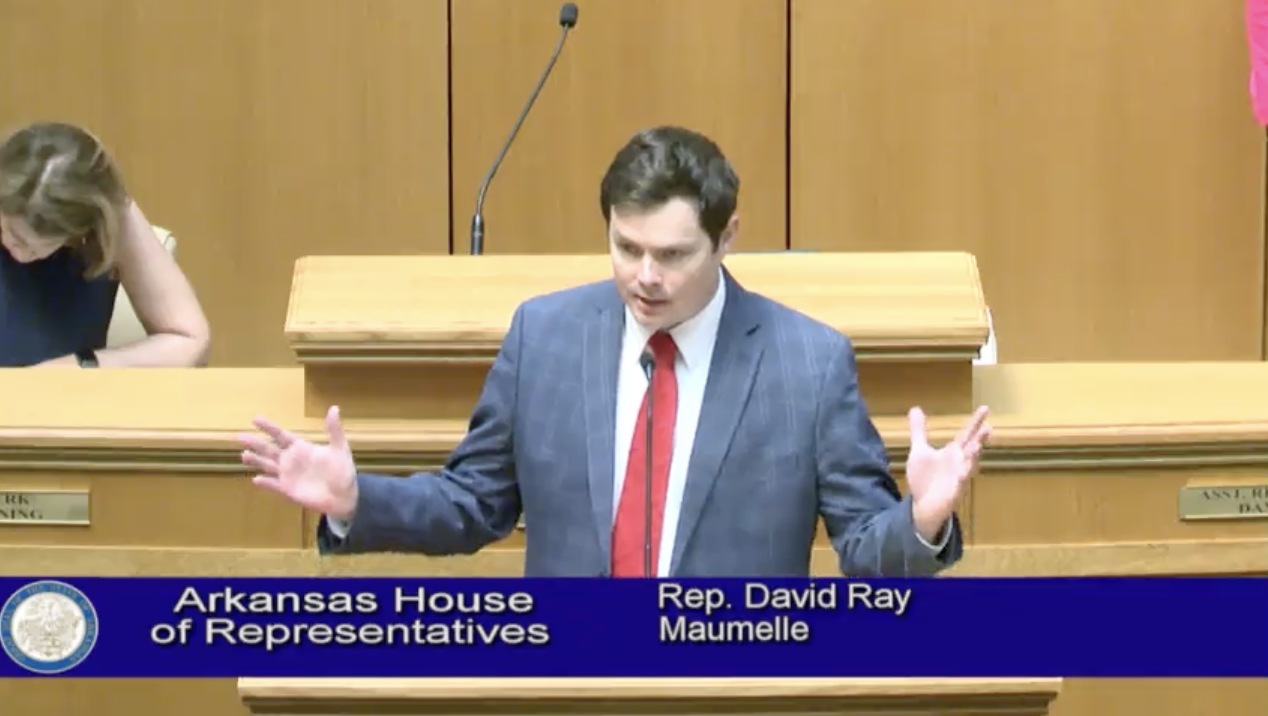Regulation
Six of eight cryptocurrency mining resolutions fall short of Arkansas House • Arkansas Advocate

The Arkansas House authorized the introduction of two bills on Wednesday proposing stricter regulations on cryptocurrency mining while six other proposals failed to gain enough votes.
All of the proposed bills would have amended Act 851 of 2023, or the Arkansas Data Center Lawwhich was passed with bipartisan support and limited the ability of state and local governments to regulate cryptocurrency mining operations.
The resolutions required a two-thirds majority vote in both houses of the legislature to be introduced during the fiscal session. The Senate passed all eight resolutions with at least a minimum of 24 votes.
Six resolutions sponsored by Rep. Josh Miller, R-Heber Springs, fell short of the 67 votes needed to pass the House on Wednesday.
Sen. Bryan King, R-Green Forest, has sponsored identical resolutions in the Senate and has been the legislature’s biggest advocate for regulating cryptocurrency mining. In an interview after the House vote, he said he believes “the solution is there” for cryptocurrency mining to come and thrive in Arkansas.
Senator Bryan King, R-Green Forest (Arkansas Legislature)
Cryptocurrency mines, large clusters of computers that harvest digital currency, are often found in rural areas because they take up a lot of space. They also require a significant amount of energy to operate and water to keep computers cool.
There are cryptocurrency mines in DeWitt and the Bono community near the Greenbrier, and officials have raised concerns about foreign ownership and whether the mines pose a national security risk. Additionally, residents in the Greenbrier area have filed a lawsuit alleging noise pollution caused by a cryptocurrency mine.
One of two policy proposals approved by the House would place noise limits on Arkansas cryptocurrency mines and prohibit them from being owned by certain foreign entities. Sen. Joshua Bryant, R-Rogers, and Rep. Rick McClure, R-Malvern, sponsored the resolution, which received 80 yes votes.
Bryant and McClure also sponsored Act 851 last year. King said the resolution they sponsored was essentially “pro-cryptocurrency.”
The other resolution, sponsored by Rep. Jeremiah Moore, R-Clarendon, would require cryptocurrency mines to be licensed by the state Department of Energy and Environment. It would also require the department to brief legislative committees on its methods of regulating cryptocurrency mining. It passed the House with 84 votes and had the patronage of Sen. Missy Irvin, R-Mountain View, in the other chamber.
Bryant and Irvin filed Senate Bill 78 AND Senate Bill 79respectively, Wednesday afternoon after their resolutions passed the House.
Debate in the room
Rep. David Ray, R-Maumelle, spoke against all six of Miller’s resolutions. He said he doesn’t believe they have addressed the three main problems he sees in crypto mining—noise, foreign ownership and proximity to residential areas—while he believes the Moore and McClure resolutions have.
Ray also said the Legislature should be careful about what non-budgetary issues are addressed as legislation during the fiscal session.
“We can do a better job of looking at these individual resolutions and choosing one or two to bring to the committee that addresses these issues that we know Arkansans are dealing with,” Ray said.
He called House Resolution 1019, which would have called for a fee based on electricity use, “the worst of the bunch” and “a de facto ban on bitcoin mining.”
Miller noted that businesses in many other industries are required to pay taxes to the state. He also said requiring notice before a cryptocurrency mining operation buys land would give citizens a warning not to buy property in an area where property values would likely decline due to noise and high utility bills.
Several lawmakers agreed with Miller that the House should allow all cryptocurrency bills to be filed so they could be debated and amended as members saw fit in committee.
“It may take a little longer to do this, but I think the time will be well invested,” said Rep. Marcus Richmond, R-Harvey. “…The only thing worse than doing nothing is doing something halfway and then going to our constituents and trying to explain to them why we got it wrong the second time anyway.”
Rep. Stephen Meeks, R-Greenbrier, said he supports all of the resolutions, especially because the cryptocurrency mine in the Faulkner County portion of his district is facing a lawsuit from local residents.
“If we fail to address this problem, we fail to protect our citizens as we should,” Meeks said.
Elsewhere in Faulkner County, the Vilonia Planning Commission voted against unanimously granting a permit to build a cryptocurrency mine in the area last June. The vote came after the city council listened to citizens’ concerns about cryptocurrency mining and voted to limit noise throughout the city in preparation for the mine’s arrival. Little Rock Public Radio reported.
Rep. Cameron Cooper, R-Romance, represents Vilonia and told the House he has received numerous complaints from constituents about the proposed mine. He said the situation led him to oppose Law 851, not yet in force as of June, even though he hadn’t previously given it much thought.
“Thankfully, the city avoided that disaster,” Cooper said. “…Self [the law] they were already in place, I don’t think they could have prevented it.”
Rep. Ron McNair, R-Alpena, said he hoped to discuss the cryptocurrency industry during the special session called by Gov. Sarah Huckabee Sanders last September, but “was told there wasn’t enough interest.”
Cryptocurrency mining came to Harrison’s McNair District in 2022, and Bill 851 encouraged the industry to continue moving into the state, he said.
“After the session, in my first town hall, there was a gentleman from New York who came to Harrison with him [Act] 851 in his hand and said, ‘We’re here because you did this,'” McNair said. “That’s what the public saw.”
Regulation
South Korea Moves to Delay Cryptocurrency Tax Until 2028 Amid Market Concerns

South Korean lawmakers have proposed a bill to delay the tax on cryptocurrency earnings until 2028.
The ruling political party proposed the bill on July 12, citing current negative sentiment around the cryptocurrency sector as the reason for the extension. declared:
“With investor sentiment toward virtual assets deteriorating, some argue that hasty taxation of virtual assets is not desirable at this time, as virtual assets are high-risk assets with a higher risk of loss than stocks, and if income tax were also imposed, it is expected that most investors would abandon the market.”
South Korea had originally planned to implement its cryptocurrency earnings tax on January 1, 2025. However, if the new bill is passed, the implementation date will be moved to January 1, 2028. The subcommittee met on July 15 to continue the review.
The move is in line with President Yoon Suk-yeol’s campaign promisesHe assured voters that he would extend the cryptocurrency earnings tax during the last general election if elected. His administration aims to create a clear regulatory framework before implementing the tax.
However, the Ministry of Economy and Finance has not yet decided on the postponement. The ministry plans to announce new amendments to the fiscal policy by the end of the month.
“No decision has been made on further postponing the implementation of taxation of income from virtual activities,” a ministry spokesperson said. She said.
South Korea’s Thriving Cryptocurrency Industry
South Korea is one of the fastest-growing countries in the world in adopting this emerging sector.
In the first quarter of this year, blockchain platform Kaiko reported that the Asian country’s national currency, the Won, emerged as the leading currency for global cryptocurrency trading, with a cumulative trading volume of $456 billion across centralized exchanges.
Furthermore, the Asian country is a shining light for its proactivity approach to cryptocurrency regulationSouth Korea has implemented different rules designed to improve consumer protection standards for cryptocurrency users in its jurisdiction.
Latest stories from South Korea
Regulation
ESAs consult on guidelines for cryptocurrency regulation

THE European Supervisory Authoritiesincluding EBA, EIPA and ESMA, have published a consultation paper on guidelines under the Markets in Cryptocurrencies Regulation (MiCAR).
In doing so, the ESAs intended to develop templates for legal explanations and opinions regarding the classification of cryptocurrencies along with a standardized assessment to support a common approach to classification. In addition, the current move is intended to assist market participants and supervisors in accommodating a standardized test while receiving legal explanations and opinions that provide descriptions of the regulatory classification of cryptocurrencies in different cases. Among them, the ESAs mention:
-
Asset-Referenced Tokens (ART), whose white paper for their issuance must be accompanied by a legal opinion that highlights the classification of the crypto-asset, especially with regard to the fact that it is not an electronic money token (EMT) or a crypto-asset that could be excluded from the scope of MiCAR;
-
Cryptocurrencies that are not considered ART or EMT under the Regulation, for which the white paper must be accompanied by an explanation of the classification of the cryptocurrency, in particular information that is not an EMT, ART or a cryptocurrency are excluded from the scope of MiCAR.
As part of the press release, the ESAs mention that the consultation paper can be submitted directly from the consultation page, with a deadline for submissions of 12 October 2024. After holding a virtual public hearing on the consultation paper on 23 September 2023, the authorities are ready to publish all contributions, unless otherwise requested.
Background
In an effort to establish a framework for the provision of crypto-asset services, MiCAR develops regimes to regulate the issuance, supply to the public and admission to trading of EMT, ART and other crypto-assets. The draft was created under Article 97(1) of MiCAR, which requires authorities to jointly provide by 30 December 2024 the Guidelines pursuant to Article 16 of the ESA Regulations (EU Regulation) No. 1093/2010 Regulation 1094/2010, Regulation 1095/2010) to specify the content and form of the explanation accompanying the white paper on crypto-assets referred to in Article 8(4) and the legal opinions on the qualification of asset-referenced tokens (ARTs) referred to in Article 17(1), point (b)(ii) and Article 18(2), point (e) of MiCAR.
In addition, ESAs are required to include in the Guidelines a model for explanation and opinion and a standardized test for the classification of cryptocurrencies. At the time of the announcement, this was the only joint policy mandate of ESAs developed under MiCAR.
Regulation
Cryptocurrency News Today – July 15, 2024

Welcome to “Crypto News Today”, your daily digest of the cryptocurrency industry.
Bitcoin ETFs surge amid price recovery, market fluctuations
Bitcoin ETFs have seen their best weekly inflows since May, with $882 million in the week ending July 11. Bitcoin’s price has recovered to around $62,000, up 15% from its recent low, reflecting renewed investor interest and market optimism. To learn more, visit the TDR website!
Bitcoin Surpasses Leveraged ETFs
Bitcoin’s price has outperformed risky leveraged ETFs like BITX and BITU, demonstrating the cryptocurrency’s relative stability in a volatile market. Investors are increasingly favoring direct Bitcoin holdings over complex financial products.
SEC Closes Investigation into Hiro Systems
The SEC has concluded its three-year investigation into Stacks developer Hiro Systems without taking any enforcement action. The move brings relief to the company and its shareholders, potentially increasing confidence in the Stacks ecosystem.
Genesis Transfers 760 Million BTC to Coinbase
Amid a market sell-off, Genesis advanced $760 million in Bitcoin to Coinbase. The large transfer has raised speculation about potential trading strategies or liquidity by the digital asset company.
JP Morgan-Backed Partior Closes $60M Series B
JP Morgan-backed blockchain firm Partior has successfully closed a $60 million Series B funding round. The funds will support Partior’s mission to simplify cross-border payments and advance blockchain-based financial solutions.
Cryptocurrencies Become The Theme of 2024
Cryptocurrencies have emerged as a key issue in the 2024 political landscape, with parties and candidates debating regulation, innovation, and the future of digital currencies. This trend underscores the growing importance of cryptocurrencies in economic and political discussions.
Read more cryptocurrency news on the TDR website!
Regulation
How Cryptocurrency Firms Are Capitalizing on MiCA’s Bumpy Launch – DL News

- The MiCA licensing regime will come into force at the end of December.
- Levels of severity vary from country to country.
- This will create opportunities for companies to engage.
Stablecoin laws have already come into force, but EU countries are rushing to comply with the rest of the Union’s new cryptocurrency regulation before the deadline.
The EU regulatory framework requires cryptocurrency businesses such as exchanges to choose a country in which to apply for a license. In practice, countries will inevitably have different levels of stringency.
The Markets in Crypto-Assets regulation is designed to introduce a level playing field across the EU, as national regulators will have to adhere to the same set of standards. Once licensed, crypto-asset service providers, or CASPs, can move their services anywhere in the bloc.
Additionally, countries are allowed to opt for longer transition periods before enforcing the MiCA rules. This is known as the grandfathering period.
All of this could call into question the level of compliance in some countries.
— Ernest Lima, XReg Consulting
That creates opportunities for cryptocurrency firms to seek out jurisdictions with lighter rules and less enforcement, said Ernest Lim, a partner at consultancy XReg. DL News.
“Cryptocurrency companies registered or licensed in different EU member states may be subject to different requirements” between January 2025 and July 2026, Lima said.
Due to time and capacity constraints, some local regulators may have difficulty processing applications in time for the deadline, he added.
“Some may not even have sufficient resources to adequately supervise licensed CASPs,” Lima said.
Join the community to receive our latest stories and updates
“All of this could call into question the level of compliance in some countries.”
Companies are already exploiting the patchy way MiCA regulations are enforced in the EU, in a practice known as regulatory arbitrage, Lima said.
Just the beginning
MiCA’s stablecoin laws went into effect on July 1st, marking the start of the launch.
The next stage is the MiCA licensing regime for cryptocurrency businesses, including exchanges, custodians and investment firms, which will come into force on December 30.
Although the new rules will be stricter, CASPs registered in one country will be able to offer their services throughout the EU27 under the MiCA ‘passporting’ provisions.
Some countries with simpler registration requirements already have significant numbers of VASPs on their registers.
Lima said he expects the number of CASPs in Europe to consolidate significantly, especially in those countries.
In countries with more flexible regulators, companies can benefit from a relatively simple registration process to enter Europe.
According to XReg data, for example, Lithuania has 588 VASPs, while Germany has 12.
Transition period
The MiCA safeguard period will also impact where companies apply for licenses, Lima said.
The grandfathering period is a transition starting on December 30, during which companies can switch to the more stringent CASP regime.
Countries can grant cryptocurrency firms up to 18 additional months from December 30, although the EU securities watchdog recommends a 12-month safeguard period.
In assessing how much time to give companies to transition to the CASP regime, countries will have considered “how prepared they are internally to process applications, the gap between MiCA and their current regime, and the number of companies currently registered in their jurisdictions, all of which influence the workload associated with the transition,” Lima said.
Some countries have announced their transition, others have not, he added.
Among those who have announced:
- France will allow a ramp-up period of 18 months. The country already has a regime similar to MiCA in place.
- Many countries, including Ireland, Germany, Spain and Austria, are opting for the recommended 12-month transition.
- Lithuania, which has very lax AML requirements and a large number of registered VASPs, has been at a standstill for five months.
- The Netherlands will implement the MiCA regime on 30 December and is already accepting applications.
Strategie
Lima said that cryptocurrency companies are evaluating different strategies to take advantage of this uneven distribution.
Some companies are aiming to comply as soon as possible, by December 30, which means they will be the first to avail themselves of passporting rights and gain market share in the EU.
“Others are opting to file multiple applications in EU jurisdictions,” he said.
This approach allows a firm to benefit from a transition period in a trusted jurisdiction while working on a MiCA application.
However, he said that time was running out: local regulators were preparing to start the MiCA application process.
“Soon there will be no more time to process new applications.”
Lima said some companies have no intention of ever complying with MiCA.
Instead, they chose to continue working as long as possible before closing their businesses for good.
Contact the author at joanna@dlnews.com.
-

 News1 year ago
News1 year ago“Captain Tsubasa – RIVALS” launches on Oasys Blockchain
-

 Ethereum1 year ago
Ethereum1 year agoComment deux frères auraient dérobé 25 millions de dollars lors d’un braquage d’Ethereum de 12 secondes • The Register
-

 News1 year ago
News1 year agoSolana ranks the fastest blockchain in the world, surpassing Ethereum, Polygon ⋆ ZyCrypto
-

 Videos1 year ago
Videos1 year agoHistoric steps for US cryptocurrencies! With a shocking majority vote!🚨
-

 Videos1 year ago
Videos1 year agoIs Emorya the next gem💎 of this Bitcoin bull run?
-

 News1 year ago
News1 year agoSolana Surpasses Ethereum and Polygon as the Fastest Blockchain ⋆ ZyCrypto
-

 Videos1 year ago
Videos1 year agoNexus Chain – Ethereum L2 with the GREATEST Potential?
-

 Ethereum1 year ago
Ethereum1 year agoScaling Ethereum with L2s damaged its Tokenomics. Is it possible to repair it?
-

 News1 year ago
News1 year agoFnality, HQLAᵡ aims to launch blockchain intraday repositories this year – Ledger Insights
-

 Regulation1 year ago
Regulation1 year agoFinancial Intelligence Unit imposes ₹18.82 crore fine on cryptocurrency exchange Binance for violating anti-money laundering norms
-

 Bitcoin1 year ago
Bitcoin1 year agoBitcoin Drops to $60K, Threatening to Derail Prices of Ether, Solana, XRP, Dogecoin, and Shiba Inu ⋆ ZyCrypto
-

 Videos1 year ago
Videos1 year agoRaoul Pal’s Crypto Predictions AFTER Bitcoin Halving in 2024 (The NEXT Solana)





















